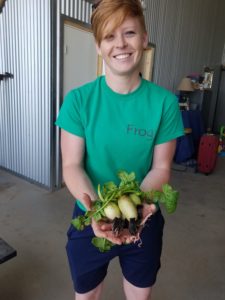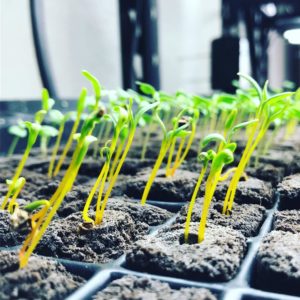
Savannah is passionate about getting people to re-think how they eat and live.
By Heather Emmons, USDA
Savannah Gates is a hydroponic farmer in Amarillo, Texas, who literally lives at the crossroads of Hope and Farmers — and lives by the connection of those words, too. Her path in life hasn’t been straight, but every curve she’s taken has helped to build her farming business into what it is today.
While she studied mechanical engineering at Texas Tech University, she traveled to Hungary to study sustainability and learned from mentors in the food and beverage industry along the way.
Ingredients for Success
Being a self-taught farmer, there are a lot of different ingredients that make up Savannah. She’s a little bit educator, communicator, entrepreneur, engineer, pioneer, and problem solver.
She is passionate about getting people to re-think how they eat and live.
“My business is called Reinventing the Weal not only because I’m an engineer, but I’m reinventing what it means to be healthy,” Savannah said. “For me, being able to produce something with a higher nutrition content that’s affordable and available for the average joe is really empowering.”
Her interest in farming began with her upbringing on her family’s small farm. As she learned about aspects of the food and beverage industry, including wine and coffee, she realized her greatest impact would be through food and beverage – starting with where food comes from.
Getting to the Root of the Matter
“The hydroponic angle was the simplest and easiest to quantify,” said Savannah. “Water is a big deal in west Texas, so hydroponics is the most sustainable way to do specialty crops.”
She’s tried to grow a variety of crops in her hydroponic towers to see what grows best in her area. Some of these crops include micro-greens, herbs, edible flowers, okra, squash, herbs, mustard greens, kale, and squash blossoms.
“We’ve done root vegetables, everything from beets, to turnips to radishes, which aren’t economical if you run the numbers for just the root vegetable,” said Savannah. “What you forget to calculate is that you get three or four harvests of greens with these plants that are absolutely beautiful. The flavor profile is fantastic.”
Studying crop application has been vital to Savannah’s operation. Through this, she has learned that building relationships between chefs and farmers is paramount for both parties to succeed.
She sends samples of her produce to chefs for them to try. She applies the same idea with her food truck, having customers taste food prepared with her produce. This has been key to her success with her partner, Chef Rose Guzman, in their catering business, and with selling to chefs and direct consumers.

Savannah has grown a variety of crops in her hydroponic towers to see what grows best in her area.
The Recipe for Success
Farm loan programs through USDA’s Farm Service Agency offer direct and guaranteed loans to farmers and ranchers to promote, build and sustain farms for a thriving agricultural economy.
With loans from FSA, Savannah was able to finance the purchase of her 43-acre farm, construction of a 3,200-square foot hydroponic facility, purchase equipment, and cover operating expenses. In addition, her farm has a commercial kitchen and a small event/education space.
In the future, she plans to add trees, juniper berries, bees, egg production, and llama meat. She’s also looking to expand her business, creating multiple farm sites that are customizable to the tastes of the area.
“It’s been tricky because we’re not the traditional revenue stream. The income is slow and steady,” she said.
The company where she bought her hydroponic growing system is now sending interested farmers to her farm to see how her facility works.
More Information
USDA offers a variety of risk management, disaster assistance, loan, and conservation programs to help agricultural producers in the United States weather ups and downs in the market and recover from natural disasters as well as invest in improvements to their operations. Learn about additional programs.
For more information about USDA programs and services, contact your local USDA service center.
JOIN THE CONVERSATION
For the digital version of this blog, visit #FridaysOnTheFarm.
Follow the #FridaysOnTheFarm story series and other news you can use on farmers.gov and our social media channels: Twitter, Instagram, YouTube, Flickr, and Facebook.





